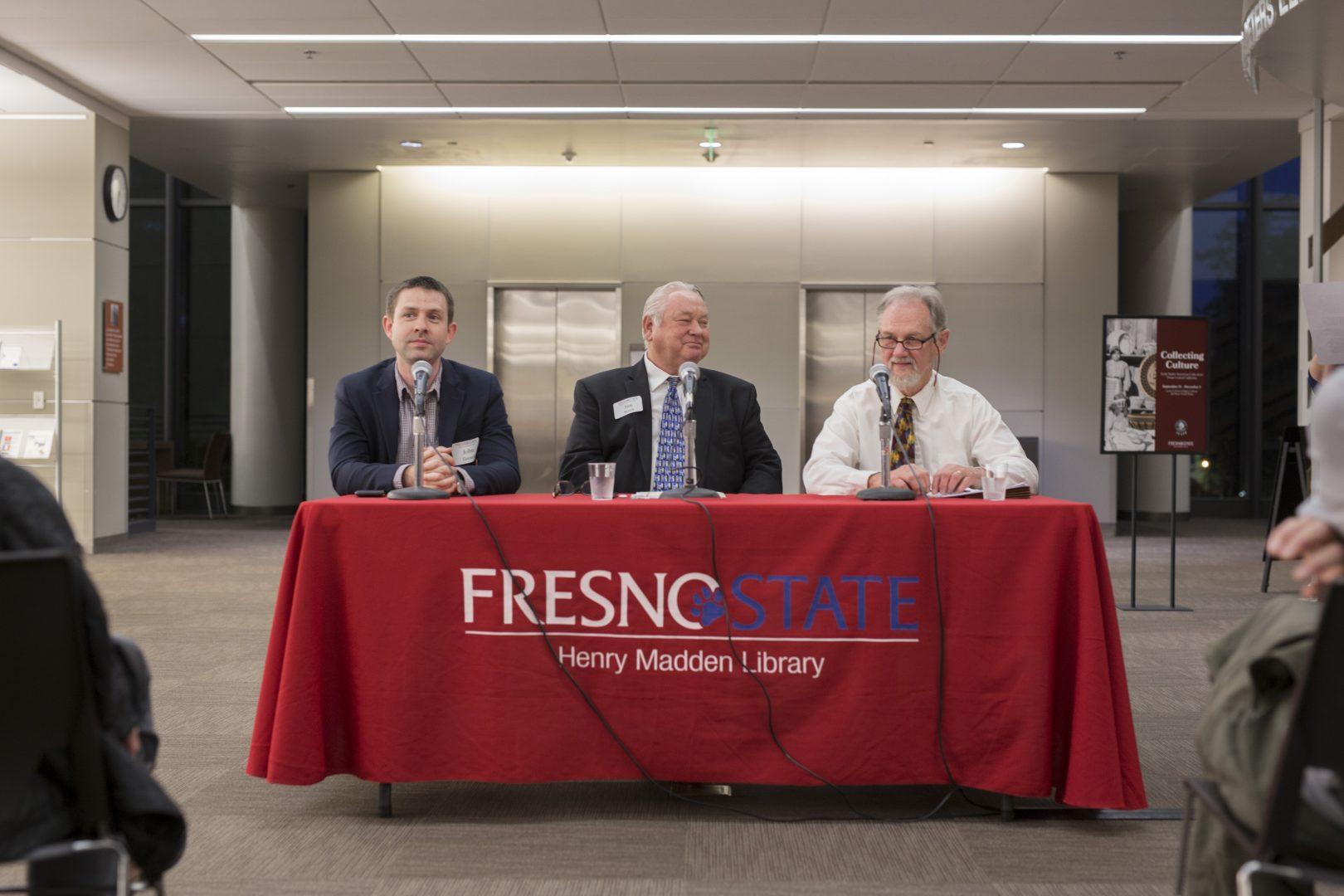With President Donald Trump popularizing the term “fake news,” the issue of error, lies and bias in the media has sparked a heated conversation about media literacy.
A panel discussion, “Fake News, Alternative Facts and Media Bias,” presented by Friends of the Madden Library, was held last Friday for students and members of the community.
Fresno State media, communications and journalism professor Faith Sidlow moderated the event that featured three media professionals from the Valley — journalist Lloyd Carter, The Fresno Bee’s executive editor Jim Boren and radio personality John Gerardi.
“There’s a difference, I think, between fake news and false news. False news can be inadvertently spread,” Carter said. “Fake denotes that you’re deliberately trying to deceive whoever your target audience is.”
Boren said The Fresno Bee offers the “Letters to the Editor” section and the comment section online to allow readers to provide feedback on content they disagree with.
“We want to give our readers a sense of community by covering a cross section of interests,” Boren said. “You may not like it, but the stories have not been made up and they aren’t fake.”
Carter and Gerardi discussed the impact Trump has had on reshaping the debate of “fake news” and media bias.
“[Trump] took this term ‘fake news’ and applied it to something that voices on the right have been complaining about for about 30 or 40 years, which is the fact that many on the right believe much of the mainstream media has a bias in favor of liberalism,” Gerardi said.
One audience member asked if political commentators like Milo Yiannopoulus and Ben Shapiro would be classified as journalists in the opinion of professionals.
Gerardi, who said he does not identify as a journalist, said that Yiannopoulus and Shapiro are people advancing as opinion makers and opinion givers.
“I wouldn’t consider them journalists in any sense of the word, although there is more and more with cable news, you see a blending of the roles between journalist and analyst and opinion giver,” Gerardi said. “Sometimes, I think that blending of roles can lead to accusations of bias in media pretty often.”
Boren noted that many of the commentators on television are not journalists, but rather partisans who can still affect people’s opinion of the media, including newspapers.
“You folks on both the left and the right lump us together with cable news, and we are not the same,” Boren said. “We are the ones debunking the cable news.”
Carter said that while newspapers are made up of facts, anyone can challenge or dispute the information. He said Trump, however, never points out factual errors but rather denies the story altogether.
“Most of the time he just uses the phrase ‘fake news,’ and it’s become meaningless in terms of American traditional media,” Carter said.
As far as the cause of “fake news,” the panelists cited money and the division of society as the cause and effect.
Boren said that in the past, liberals and conservatives would have clashing ideals but still managed to socialize civilly.
“Now, if you don’t agree with somebody, you have to hate them,” he said. “It just splits the country apart, and I long for the time that we can get back together and disagree agreeably.”
Carter said that the progression of technology, the internet and other information sources throughout his lifetime have opened up the world to an “avalanche” of information.
“A lot of [information] is inaccurate. So to protect yourself if you’re serious about a subject, you need to start going to some of these fact-checking websites and get some opinions,” Carter said.
Some fact-checking websites he mentioned include snopes.com, pewresearch.org and factcheck.org.
Sidlow also suggested Blue Feed, Red Feed through the Wall Street Journal and allsides.com as fact-checking resources.
Gerardi said although “fake news” is a big problem, as a millennial, he doesn’t find it as problematic as it seems.
“I think maybe it’s just because I’ve grown up in the internet age and maybe I’ve developed a lens through which to view this,” he said. “But I think most adults are able, in many cases, to discern truth from fact.”
A student in the audience asked how to communicate with other generations about differing opinions, and Boren said that listening rather than talking may help find common ground.
“I think in America today, we all need to be appreciative of the other points of view and listen to them and not get in our silos,” he said.
Taylor Cook, a senior majoring in public health and minoring in philosophy, attended the panel for an extra-credit assignment for her epistemology philosophy class and noticed most of the audience was older and white.
“We only have a portion of our society getting involved in discussions and choosing where they want to get involved in discussions,” Cook said.
Cook said she expected the panel to consist of conservative rebuttals to liberal perspectives. She also said she noticed a disconnect in the audience from the different viewpoints of the questions asked and the answers given.
“I think a lot of people are unwilling to hear what other people say, and that’s such a disservice to everyone,” she said. “It doesn’t disaffirm someone else’s opinions, but it’s difficult to separate your emotions and your own political biases from what you’re hearing that goes against your own truth.”
Cook said, while the discussion isn’t necessarily representative of all of society, the event showed her more of what the Fresno community is like.
“It just shows more of what our climate is here and what we as young people are following and where our change and where our action needs to be,” she said.




